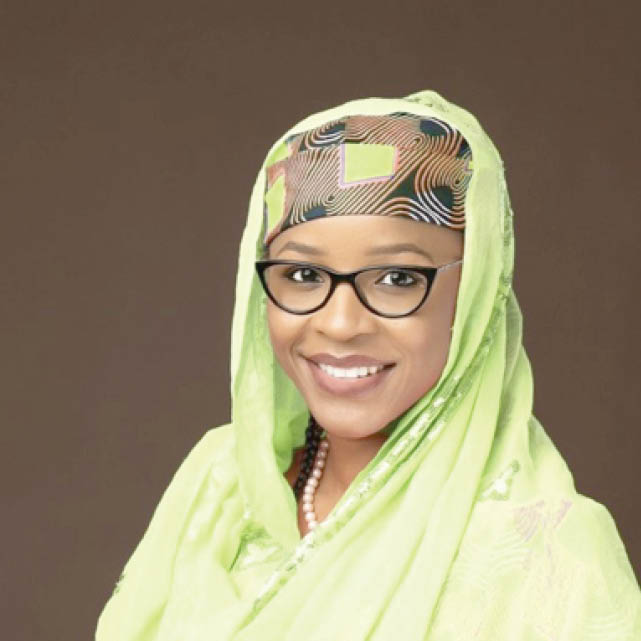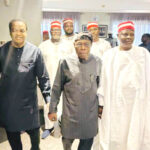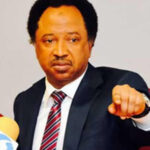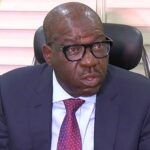Aisha Augie is an internationally celebrated creative artist, photographer, filmmaker and communication specialist from Nigeria. She has drafted, applied various creative strategies and led initiatives for community building and value creation. She is multi-faceted with the relevant experience as an entrepreneur working in multiple industries in the private sector before delving into the public sector. She is a bridge builder between sectors and engages in policy formulation and development initiatives that support job creation, youth and women empowerment across Africa. Most recently, she served as a Special Adviser to the Minister of Finance, Budget and National Planning. Prior to this, she was a Senior Special Assistant on New Media to the governor of Kebbi State. She is a mother, wife and daughter to Justice Amina Adamu Augie. In this interview she speaks on her journey from the world of creative arts to politics, as well as other interesting issues.
Your career has been interesting—from being a creative artist to becoming a politician; tell us all about it.
I grew up as a very curious child; I always liked to know how things were made. Photography was one of those things that caught my mind. I wanted to know how they got something on a piece of paper. So, in asking those questions, I got more and more into it. It was something I had always loved since I was a child. And my father supported me early. It is a medium of expression, so he gave me a film camera. I would use it and he would help me print whenever he travelled. Then early days in Sokoto, I had a year when I had a whole suitcase of images, as well as in Kaduna. That’s how it started.
I started Mass Communication and did a course in Photo Journalism. I think I was the only one who took that course in Ahmadu Bello University, the best in Nigeria.
Taking the course led to more questions that led to a whole different career because, as you know, when you were done with school, it wasn’t like now that you have private sector jobs waiting. Most people were always waiting for the public sector because we really didn’t have a diversified economy where other jobs were as good. We are talking about early 2001/2002.
I ended up doing other jobs like marketing, customer service and human resources in the private sector, including the insurance and pension firm. I did very well. I was the head of the Human Resource Department. I left to become a fulltime photographer because of children and family issues. I wanted to make time for my family and that allowed me to choose my hours. Everyone thought I was mad, but it happened.
Stories went on, especially because there was a huge gap in northern Nigeria, even with us as women. I think for the first time it really hit me when I went to a wedding and there was no documentation of the traditional side because the men weren’t allowed to go into those places and we didn’t have female photographers. It was a huge gap at the time, so I felt I could provide a solution by documenting our stories, especially the women of northern Nigeria. I think that back in the day we didn’t take it seriously as events, but I found those days to be the most intriguing when it came to events. And that led to other things. I started doing development photography and communication, asking questions like: Shouldn’t the government be doing this? Who is in charge? I was working with different development firms. That led me back to Kebbi and everything changed from there.
And you went straight into politics?
It wasn’t straight into it, so to speak. It was from the perspective of how to support the people and government to understand each other and communicate. For example, you have a governor being lied to by some of his trusted people about what they had done. And you have all the time to visit these places. In the past we didn’t have photography where you could document and showcase. It was more like whatever document was brought you would just accept, or if you had people do a Google check for you, it was okay. But when you have people colluding with one another, how do you know the truth about these projects.
Photography helped bridge that gap where citizens can say this is what we have in our community, this is the quality and this is what we have seen. Then the government can come and say these are the reports I have and find a way to bridge the gap. You have a lot of projects that are done without data, which used to happen a lot in the past.
As a northern female politician, how has it been?
I feel that being a female hasn’t stopped me; rather, it has propelled me. It started with photography—if people saw my work and said “it was Aisha,” it took precedence. I had colleagues that did better work than me but they didn’t get the attention I got because it was like an anomaly for a female to do what I was doing. It is the same kind of situation with politics. You have the people that will give you all the reasons you shouldn’t be part of it.
A female politician doesn’t have the best reputation. You have men that feel women should not be mingling or seen in spaces where decisions are made. It is part of the culture; it is not necessarily them trying to put you down. A lot of it comes from a level of protection, where it is like women should not be here because they are meant to be protected.
When it comes to politics, I am very much of the opinion that you cannot think for the women or children. The women should be able to represent their voices. We should be able to speak in rooms where decisions are made and say this is our problem and we want solutions. And 49.5 per cent of the population are women, so we should have a say. That’s one of the propelling factors.
You are the daughter of Justice Amina Adamu Augie; many will wonder why you didn’t become a lawyer?
I am super proud and honoured to be her daughter. Of course I wanted to read Law at the early stages. In fact, I actually commenced, but due to some factors and certain reasons, including cultism, I couldn’t continue. I had been attacked once or twice due to invitation from cultists and my dad felt that was not the right place, so I moved to Zaria.
Looking back in retrospect, you would see how God guides steps. I believe in God. I am not super religious but I am very spiritual. I genuinely believe that God has plans for us. There are certain steps you need to take and I look back now and realise that it was all written. I am where I am today because of the path I took reading Mass Communication.
Yes, in the beginning she had few issues. She was a full blown career woman who felt I should have a proper career. She thought that photography, where you would be running around and carrying a camera, was not a career. And oddly enough, I had an interview with 40 chief executive officers, and for the first time, I expressed how it made me feel. I felt I just needed support and I was being told why I couldn’t. I just decided that I would still go ahead and see what would happen. Today, she is very proud of me. She is my number one fan and supporter.
Generally, what motivates you?
Looking back in life and all I have been through, having a strong mum is super important. She never gives up. We have been through so much as a family. My dad died in 2001 and she has been the matriarch of the family. She never lets go. My dad was my strong supporter. He had encouraging words for me early. So I feel I can’t disappoint them. That is a strong motivating factor. I think it is all cliché stuff but I feel it is one of the reasons I wake up every day and think I am just going to keep going, sunrise and sunset.
I made a deliberate decision that every time I see a sunrise and sunset, I am reminded that nothing lasts forever. If anything bad is going to happen to us today, it doesn’t mean it is going to be the same thing tomorrow, and once you are able to sleep and wake up with that mindset, you don’t really feel stressed. And I get to do the jobs I love right; that’s a good motivation.
Amongst creative art, photography, politics and advocacy, where do you find peace; where is your heart?
I love art; it is my life. I love to paint and create. I do mixed media. I love to make videos and tell stories. I love to express and showcase. I am currently the creator-general. The world will hear that name soon.
What does it mean to be an advocate for the creative and cultural sector?
I became an advocate years ago because it supported me entrepreneurially. I was over 10 years as a fulltime entrepreneur. I ran a studio, did photography and was freelancing at some point. I didn’t have the kind of support I felt I could get, especially with the kind of jobs I have created, directly and indirectly.
I know the industry is a huge field that can create jobs for us and we need them. Young people are very expressive and you can see that today with Tiktok, and Instagram. Back in the days, to do a skit, we know how much effort one needed to put to create it, but they have an avenue to express it. So, how do we professionalise that sector to create more jobs? How do we document these young people because 60 per cent of Nigerians, if not more, are young?
We have the human capital and we are very creative people. I am not just speaking for Nigeria but Africa as a whole. We will continue being a voice for the sector. If we had that kind of support early we would have done a lot more.
You are a female activist and have worked in the federal, state and the private sector. Nigerian women have been agitating for 35per cent affirmation; do you think Nigeria is getting it right when it comes to female representation?
We are not. And genuinely, we will not. I think we need to start looking at things from the perspective of the economy. I left the Ministry of Finance awhile back and I kind of have an idea of how an economy is run. We are really not tapping into the potentials of women. It is not even about representation anymore, it is everything.
Social enterprises are mostly run by women and that’s because they think of solutions that are beyond them and maybe a legacy they would leave for their families. We think of the bigger picture. We have been trained to take care of our communities and families.
We are not doing enough. We have some male allies but there’s still that perspective of competition, thinking that the women are coming to take over and give orders, but no. It is more like: How do we support you that are already running things to make them better for everybody?
We are not getting it right because we do not have the representation. For example, my state recently announced 30 special advisers and there was only one female, who is for women affairs. Where were all the women that supported during the campaign? When it is time to campaign and be on the road, we are the first they pack in their buses.
But most people will say they are looking for technocrats. How do we break that jinx if we don’t have female technocrats?
Do you look for technocrats when you are appointing the men? That’s the question. Let’s make it the same. If you have men that are not technocrats but still running things, then I don’t see why women shouldn’t have such opportunities too. I am not saying we should hire incompetent people, however, we have spaces where incompetent people have been hired and they are male, so why not an incompetent woman too? It is not being equal right now, it’s about representation and we need people in the room.
I think that for being in politics and governance, you have to understand what it means to be a technocrat. You can’t be a technocrat 100 per cent and win on the political side, so we need to find a balance between the two when it comes to male and female. However, all I am saying is that those excuses do not work anymore because at the end of the day you have men that don’t fit into those leadership roles.
You once said, “No one understands us more than ourselves, so we must tell our stories our own way,” how have you been able to tell the Nigerian story your own way?
That quote came from an international interview, and it was from the perspective of how Africa is being shown to the world. The Africa most of the world gets to see is dilapidated, poverty-stricken, mostly always about the sick child, HIV, malaria and all sorts of things like that. I felt we don’t have that level of representation of who we are as a people. We know that those things happen, but we also have a lot of development going on right now. That inspired my quote. I want to show things as they are, the beauty with which I see it.
A poor community doesn’t mean people that are not happy. I went to a community in Niger Republic in the Tillabéri region and it was the cleanest village I had ever seen. I was sent to document water, cholera and all sorts. But the community was very beautiful. Looking at the way they supported themselves, I felt the story I was sent to do didn’t match what I experienced. I would live there if I could, but they didn’t have electricity and barely had water, which was why the non-governmental organisation sent us there.
I felt we could showcase more hope and inspirational stories; we should document people who are doing beautiful things in their communities.

 Join Daily Trust WhatsApp Community For Quick Access To News and Happenings Around You.
Join Daily Trust WhatsApp Community For Quick Access To News and Happenings Around You.


